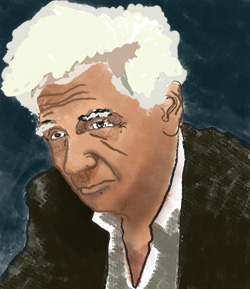“La vita è l'origine non rappresentabile della rappresentazione.”
Origine: Da La scrittura e la differenza, traduzione di G. Pozzi, Einaudi, Torino, 1990, p. 301.
Jacques Derrida, nato Jackie Élie Derrida , è stato un filosofo, saggista, accademico ed epistemologo francese.
Professore prima all'École Normale Supérieure, co-fondatore del Collège International de Philosophie e poi, fino alla morte, directeur d'études presso l'École des Hautes Études en Sciences Sociales di Parigi, il suo nome è legato al concetto di decostruzione, che ebbe una forte influenza sul pensiero della seconda metà del Novecento, in ambiti disciplinari molto diversi dalla filosofia, come la linguistica, la critica letteraria, la teoria politica, la giurisprudenza, gli studi religiosi, la teoria dei media, l'antropologia, gli studi culturali, l'architettura , gli studi postcoloniali, gli studi di genere e la psicoanalisi. La sua opera, che ebbe una diffusione globale, in particolare negli Stati Uniti e in Sud America, è solitamente associata al cosiddetto post-strutturalismo francese o al postmodernismo, benché Derrida non si sia mai riconosciuto in queste denominazioni.
Influenzato dalla fenomenologia di Edmund Husserl e dall'ontologia fondamentale di Martin Heidegger, il suo pensiero si concentrò inizialmente sui problemi epistemologici della filosofia francese degli anni sessanta, riguardanti lo statuto delle scienze umane, il contributo della psicoanalisi e della linguistica e il superamento dell'umanesimo. In seguito, a partire dagli anni ottanta e novanta, l'interrogazione di Derrida si rivolse a temi di carattere etico e politico, fra cui il cosmopolitismo, la natura della democrazia, i diritti umani e animali, l'idea di Europa e la crisi della sovranità. I suoi interventi lo resero una delle voci pubbliche più note nel panorama intellettuale europeo, al punto da essere più volte indicato come possibile vincitore del Premio Nobel per la Letteratura.
Il suo pensiero, esposto in uno stile difficile per via di un complesso lavoro sul linguaggio filosofico, è stato spesso oggetto di controversie, forti polemiche e talvolta netti rifiuti, soprattutto nel mondo della filosofia analitica anglosassone.
Wikipedia

“La vita è l'origine non rappresentabile della rappresentazione.”
Origine: Da La scrittura e la differenza, traduzione di G. Pozzi, Einaudi, Torino, 1990, p. 301.
Origine: Da Spettri di Marx, p. 131.
Origine: Da Decostruire il terrorismo, in G. Borradori, Filosofia del terrore. Dialoghi con Jurgen Habermas e Jacques Derrida, Laterza, Roma-Bari, 2003, p. 137.
Origine: Da L'animale che dunque sono, p. 89 http://books.google.it/books?id=ELVYE31dgKMC&pg=PA89.
“Sono vegetariano nell'anima.”
Attribuite
Origine: Citato in David Wood, Come non mangiare. Decostruzione e umanismo, in Jackie D. (rivista Animot. L'altra filosofia, n. 1, anno 1, giugno 2014), Graphe.it edizioni, p. 141 http://books.google.it/books?id=9STcAwAAQBAJ&pg=PA141: "Si dice che Derrida, durante la conferenza di Cerisy nell'estate del 1993, abbia affermato: «sono vegetariano nell'anima»."
Origine: Da Della grammatologia, Jaca Book, Milano, 1969, p. 219.
o almeno delle nuove figure di forze sociali per le quali credo siano in effetti necessari nuovi concetti, e dunque – forse – anche dei nuovi nomi
Origine: Da Marx & Sons, Mimesis, Milano, 2008, p. 269.
“L'animale ci guarda e noi siamo nudi davanti a lui. E pensare comincia forse proprio da qui.”
Origine: Da L'animale che dunque sono, p. 68 http://books.google.it/books?id=ELVYE31dgKMC&pg=PA68.
“Siamo tutti mediatori, traduttori.”
Origine: Citato in AA.VV., Il libro della filosofia, traduzione di Daniele Ballarini e Anna Carbone, Gribaudo, 2018, p. 310. ISBN 9788858014165
“Non cedo mai alla tentazione di essere difficile per fare il difficile.”
Origine: Citato in AA.VV., Il libro della filosofia, traduzione di Daniele Ballarini e Anna Carbone, Gribaudo, 2018, p. 313. ISBN 9788858014165
Cogito and The History of Madness, p.37 (Routledge classics edition)
Writing and Difference (1978)
Cogito and The History of Madness (Routledge classics edition)
Writing and Difference (1978)
"The Ends of Man," Margins of Philosophy, tr. w/ notes by Alan Bass. The University of Chicago Press. Chicago, 1982. (original French published in Paris, 1972, as Marges de la philosophie). p. 116
Specters of Marx (1993), 1970s
Plato's Pharmacy, intro
Dissemination (1972)
Plato's Pharmacy
Dissemination (1972)
Derrida (2003 documentary), referring to his personal library
Specters of Marx (1993), 2000s
We have heard this and we will hear it again.
Injunctions of Marx
Specters of Marx (1993)
“I am one of those marranes who no longer say they are Jews even in the secret of their own hearts.”
"Circumfession." In Jacques Derrida, eds. G. Bennington & J. Derrida, trans. G. Bennington. Chicago: University of Chicago Press, 1993, p. 170
The animal looks at us, and we are naked before it. Thinking perhaps begins there.
Specters of Marx (1993), The Animal That Therefore I Am, 1997
"The Ends of Man," Margins of Philosophy, tr. w/ notes by Alan Bass. The University of Chicago Press. Chicago, 1982. (original French published in Paris, 1972, as Marges de la philosophie). p. 123
“Circumcision, that’s all I’ve ever talked about.”
"Circumfession." In Jacques Derrida, eds. G. Bennington & J. Derrida, trans. G. Bennington. Chicago: University of Chicago Press, 1993, p. 70
Plato's Pharmacy, Pharmacia
Dissemination (1972)
Cogito and The History of Madness, p.37 (Routledge classics edition)
Writing and Difference (1978)